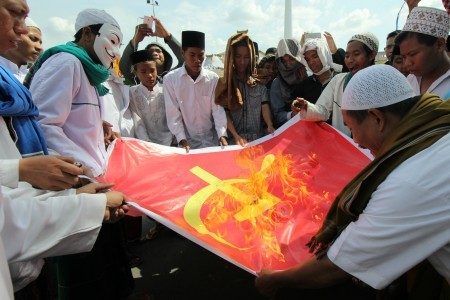Popular Reads
Top Results
Can't find what you're looking for?
View all search resultsPopular Reads
Top Results
Can't find what you're looking for?
View all search resultsFear is not Islamic: Reflection ahead of Ramadhan
Unfortunately, many Muslims fall to divisive propaganda without questioning the power play behind it. Support from Muslims to ban “leftist” books is especially sad; instead of upholding Islamic values they are emulating the destruction of the House of Wisdom in Baghdad in 1258 AD. They are crippling one of the most important principles in Islam, the preservation and distribution of knowledge.
Change text size
Gift Premium Articles
to Anyone
 Members of hardline group Islamic Defenders' Front (FPI) burn a fabric with a communist symbol in front of East Java Governor Office in Surabaya, East Java on June 1. They rejected any efforts on reconciliation, rehabilitation and compensation toward members of the now-defunct Indonesian Communist Party (PKI) and also warned public on the danger of communism. (Antara/Didik Suhartono)
Members of hardline group Islamic Defenders' Front (FPI) burn a fabric with a communist symbol in front of East Java Governor Office in Surabaya, East Java on June 1. They rejected any efforts on reconciliation, rehabilitation and compensation toward members of the now-defunct Indonesian Communist Party (PKI) and also warned public on the danger of communism. (Antara/Didik Suhartono)
I
t is appalling how much fear the government and society have in this supposedly multicultural and multi-religious nation. Following the wave of homophobic and anti-transgender attacks on members of the LGBTQ ( lesbian, gay, bisexual, transgender and queer ) community, fears have been raised again over anything and everything “communist”.
Defense Minister Ryamizard Ryacudu is among those trumpeting such fears. Some Indonesian Muslims zealously defend the officials who made flippant remarks about the “threat of the hammer and sickle”, while others are sick with the fear of symbolism, perhaps invoked by officials and politicians to silence the critical masses.
A fear of almost everything, from communism to feminism, is supported and propagated by Islamic elements like the notorious Islam Defenders’ Front ( FPI ).
The notion of fear does not have a place in Islamic teachings because of two main reasons. Firstly, Islam itself originated in seventh century Mecca as “the alienated other” of that time. Prophet Muhammad was an orphan who, by the age of 6, had lost his father and mother. His clan, the Quraysh, was a ruling tribe of Mecca at that time, but his immediate family were very poor and not part of the ruling elite.
His mission is said to have been built on the foundation of questioning and criticizing the Mecca elites who vested their political and economic interests in the continuation of the polytheistic practices and oppression of women and the poor.
Muhammad was thus a revolutionary figure who spoke truth to power.
Secondly, at the heart of Islamic teachings are the principles of social justice ( ‘adl ) and goodness and beauty ( ihsan ). The two principles are supposed to influence every single act undertaken by a Muslim in their day-to-day lives. The Koran mentions that Muslims must aim for justice for all, even when it means that they should stand against their own family. The Koran also exhorts Muslims against following misleading paths, even if it means that they need to stand against their fathers. Islam is an inherently egalitarian faith that upholds critical thinking and attainment of justice as its core teachings.
Thus it is very hard to imagine that the fear of the other arises from Islamic teachings as zealots say when justifying propaganda and violence against, for instance, anything “communist”.
Unfortunately, many Muslims fall to divisive propaganda without questioning the power play behind it. Support from Muslims to ban “leftist” books is especially sad; instead of upholding Islamic values they are emulating the destruction of the House of Wisdom in Baghdad in 1258 AD. They are crippling one of the most important principles in Islam, the preservation and distribution of knowledge.
Amid all this hatred, if we are serious about doing something in the name of Islam, we should pick the side of the oppressed, rather than that of the oppressors. We should pick the side that supports the struggle of the “Mothers of Kendeng” against the construction of cement factories, for example, rather than the side of those who block their struggle, the corporations and the government.
Second, regardless of the issue, we should always question the power play and vested interests that has led to so much violence.
If you are a Muslim and drifting through the issue of anti-communism, at least ask yourself whether you completely understand what communism is.
Islam is a religion that yearns for justice and does not stand with those who have and abuse power. Since its very inception it has been rife with an egalitarian spirit and concerns for giving back a voice to the voiceless. The Koran does not reference a preferred form of government, nor political ideologies. So, the next time you are asked to stand against communism in the name of Islam, remember that Islam only stands for one “ideology” — the shared dignity of humanity.
***
The writer is Nostra Aetate Fellow ‘16 at the Pontifical Gregorian University, Rome.
---------------
We are looking for information, opinions, and in-depth analysis from experts or scholars in a variety of fields. We choose articles based on facts or opinions about general news, as well as quality analysis and commentary about Indonesia or international events. Send your piece to community@jakpost.com.









